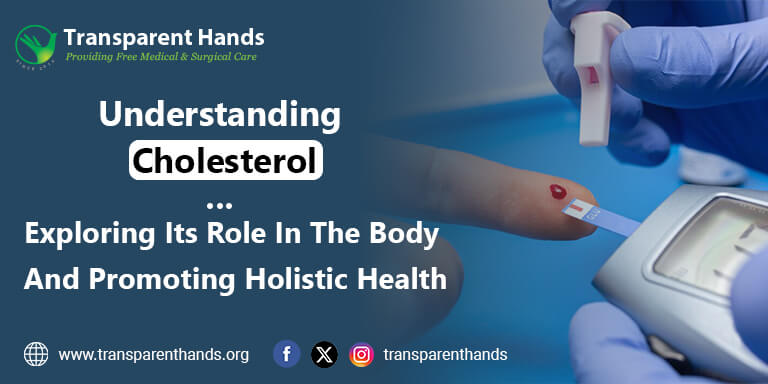Understanding Cholesterol: What Part Does it Play in the Body?

Cholesterol – a term often accompanied by a stigma, portraying it as the villain in the narrative of heart health. But is it truly the adversary it’s made out to be? Let’s embark on a journey of understanding cholesterol from a different perspective, recognizing its dual role in supporting and challenging our well-being.
What is Cholesterol?
Picture cholesterol as a backstage worker, present in all the cells of the body, diligently contributing to various tasks. It’s a fat-like, waxy substance that not only builds cell membranes but also crafts essential hormones like testosterone and estrogen. Found in animal-sourced foods, it’s a versatile player involved in digestion, vitamin transport, and cell creation.
While the liver is a proficient cholesterol producer, our dietary choices, particularly high consumption of trans and saturated fats, can tip the scales from a healthy balance to an unhealthy excess.
Is All Cholesterol Bad?
To learn more about this, let’s acquaint ourselves with the two components – LDL (Low-Density Lipoprotein) and HDL (High-Density Lipoprotein) cholesterol.
LDL, often dubbed the “bad” cholesterol, tends to accumulate in arteries, forming plaques that can lead to atherosclerosis, elevating the risk of heart disease. On the other hand, HDL, the “good” cholesterol, aids in removing LDL from arteries, transporting it back to the liver for breakdown and elimination.
In simple terms, cholesterol isn’t entirely malevolent; our bodies need a certain amount for proper functioning. It’s the delicate balance – too much LDL or too little HDL – that poses a risk to heart health.
How to Lower Cholesterol Fast?
What Does Cholesterol Do?
Now, let’s spotlight the roles cholesterol plays in our bodies:
Building Cell Membranes: Imagine cholesterol as the architect, constructing protective cell membranes that regulate substance flow in and out.
Making Hormones: Cholesterol steps into the role of a facilitator, contributing to the synthesis of vital hormones such as cortisol, estrogen, and testosterone.
Carrying Vitamins: Playing the transport expert, cholesterol facilitates the movement of fat-soluble vitamins (A, D, E, K) in the bloodstream.
Bile Acid Production: Cholesterol dons the hat of a multitasker, aiding the liver in producing bile acids crucial for fat digestion.
As we consume cholesterol, it traverses the bloodstream via lipoproteins, contributing to these pivotal bodily functions.
How Does it Affect the Human Body?
Cardiovascular and Circulatory Systems
Imagine the bloodstream as a bustling highway. Excessive LDL cholesterol can narrow and stiffen arteries, a process known as atherosclerosis. Like a dedicated traffic manager, the heart must work harder to pump blood through these narrowed paths. Over time, plaque buildup can lead to heart disease, angina, and potentially, a life-altering heart attack or stroke.
Endocrine System
In the intricate network of the endocrine system – the hormone regulators – cholesterol takes center stage. It influences the production of vital hormones, creating a delicate system that impacts metabolism, growth, reproduction, and mood. Changes in cholesterol levels, in turn, influence estrogen, testosterone, and cortisol, showcasing the interconnectedness of these bodily functions.
Cholesterol and the Brain
The brain, housing about 25% of the body’s total cholesterol, relies on this substance for the development and protection of nerve cells. However, an excess can lead to strokes, impairing brain functions and potentially causing memory loss, movement problems, and communication difficulties. High blood cholesterol has also been linked to memory loss and mental decline, emphasizing the importance of maintaining a delicate balance.
Cholesterol and the Digestive System
In the intricate dance of the digestive system, cholesterol plays a pivotal role in bile production – a digestive fluid essential for breaking down fats. However, an excess can lead to painful gallstones. Managing healthy cholesterol levels is not just about heart health; it also impacts the digestive system’s functionality.
How to Healthy Cholesterol Levels?
In the complex layout of bodily functions, maintaining healthy cholesterol levels becomes paramount. Here are some notes from experts:
Limit Animal-Sourced Foods: Consider this as the main culprit – moderation is key.
Adopt a Healthy Diet: A diet low in saturated and trans fats, and rich in fruits, vegetables, and whole grains, balances cholesterol levels.
Explore Low-Cholesterol Diet Plans: Think of this as an assistant to your proactive efforts. A low-cholesterol diet can take your efforts a long way and help you lower unhealthy levels significantly.
Exercise Regularly: Regular physical activity can help regulate cholesterol levels in your body.
Maintain a Healthy Weight: A healthy weight by diet or exercise can help keep everything in place and healthy.
Quit Smoking: What most people do not know is that smoking directly impacts cholesterol. It makes the LDL in your arteries stickier, making it difficult for blood to flow.
Conclusion:
Contrary to the common misconception, cholesterol is not the villain in our health narrative. It’s a multifaceted character, playing pivotal roles in bodily functions. Understanding our bodies, acknowledging the impact of our diets, and embracing a holistic approach to health can help us be aware and make informed decisions for better health accordingly. By increasing awareness and adopting heart-healthy practices, we ensure that good cholesterol remains a constant in our bodies.










Leave Your Comments